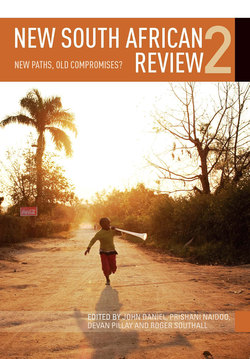Читать книгу New South African Review 2 - Paul Hoffman - Страница 31
На сайте Литреса книга снята с продажи.
ZIMBABWE AND THE PATHOLOGIES OF ONE-PARTYISM
ОглавлениеIn addition to its economic meltdown, there have been three defining features of Zimbabwe’s descent into authoritarianism. First is an entrenched political culture of ‘liberationism’, by which we mean a belief, on the part of those who prosecuted the liberation struggle, that they should now be considered uniquely privileged political actors and able to operate largely unconstrained by the norms and conventions governing competitive, multiparty politics. In this worldview, the liberation movement can never be perceived as ‘just another party’ in a post-liberation setting. It is entitled to rule and to speak indefinitely on behalf of ‘the people’. The popular will is interpreted by the party and not by the people. Voting against the party is intolerable, unacceptable and a sign of false consciousness to be remedied by a programme of ‘reorientation’ – and the Zimbabwean experience between April and June 2008 underlined the precise meaning of that term to brutal effect. This is, in effect, the politics of divine right and it provides a salutary lesson in the degeneration to which ‘liberation politics’ and liberation movements can be prone.
The second feature is a militaristic cult of the warrior, prominent in both ANC and Zanu discourses, which takes a masculinist view of the nation and the struggle for national liberation (Suttner, 2010). The struggle is identified as a ‘conquest’ and violence is viewed not as a regrettable and tragic necessity but as something positive in itself. In Zimbabwe, such a politics is now flouted openly with only token nods in the direction of multiparty democracy or pluralism per se. To both Zanu and Mugabe, the MDC is ‘a Western project which must be buried’ (Jongwe, 2010), effectively a declaration of war on the opposition in which the leader claims for himself the right to stand above the choices made by actual voters and for the ruling party’s interests to transcend the verdict of the ballot box (Hamill and Hoffman, 2008).
The third distinguishing feature of Zimbabwe’s decline is the extent to which the state itself has become a compliant instrument of the ruling party. The state media is slavish in its veneration of Zanu PF, particularly the Herald newspaper which has abandoned even the pretence of independent journalism, while the judiciary has been fully colonised by party loyalists. Most servile of all is the Zimbabwe Electoral Commission, an organisation which delayed the publication of election results for five weeks under orders from a defeated ruling party, and rewrote its own rules at the behest of the same party. The demarcation lines between Zanu PF and the security forces have been eroded, with the army and police required to serve as partisan forces to be deployed against opposition structures (and voters) as well as joining the drumbeat of propaganda against them, an action inappropriate for supposedly neutral servants of the state. It was police chief Augustine Chihuri, and Constantine Chizenda, the most senior commander of Zimbabwe’s army, who said that they would never salute a ‘sell out’ or a ‘British stooge’ (Sokwanele, 2009), a statement typical of the anti-colonialist invective which has now become an ideological comfort blanket for Zanu PF and its sole means of responding to the country’s wider political and social crisis. It was the same security forces who announced in 2002 that they would not accept any result that ‘went against the revolution’ (Amnesty International, 2006). Currently they have thrown their weight behind Gideon Gono and Johannes Tomana, the reserve bank governor and the attorney-general respectively, unilaterally appointed (or reappointed) in violation of the terms of the September 2008 unity accord between Zanu and the MDC, which clearly states that all senior government appointments must be made with the consent of the three principals (namely, Mugabe, and the leaders of the two MDC factions, Tsvangirai and Arthur Mutambara), and that these appointments include those of the reserve bank governor and the attorney-general.
